
How to Write a Reflective Essay: Easy Guide with Pro Tips

Defining What is a Reflective Essay: Purpose + Importance
Being present is a cornerstone of mindfulness and meditation. You must have often heard that staying in the moment helps you appreciate your surroundings, connects you with people and nature, and allows you to feel whatever emotions you must feel without anxiety. While this is helpful advice as you become more focused and avoid getting lost in thought, how can you truly appreciate the present without reflecting on your past experiences that have led you to the current moment?
We don't say that you should dwell on the past and get carried away with a constant thought process, but hey, hear us out - practice reflective thinking! Think back on your previous life events, paint a true picture of history, and make connections to your present self. This requires you to get a bit analytical and creative. So you might as well document your critical reflection on a piece of paper and give direction to your personal observations. That's when the need for reflective essays steps in!
In a reflective essay, you open up about your thoughts and emotions to uncover your mindset, personality, traits of character, and background. Your reflective essay should include a description of the experience/literature piece as well as explanations of your thoughts, feelings, and reactions. In this article, our essay writer service will share our ultimate guide on how to write a reflective essay with a clear format and reflective essay examples that will inspire you.
How to Write a Reflective Essay with a Proper Reflective Essay Outline
To give you a clear idea of structuring a reflective essay template, we broke down the essential steps below. Primarily, the organization of a reflective essay is very similar to other types of papers. However, our custom writers got more specific with the reflective essay outline to ease your writing process.
Reflective Essay Introduction
When wondering how to start a reflective essay, it is no surprise that you should begin writing your paper with an introductory paragraph. So, what's new and different with the reflection essay introduction? Let's dissect:
- Open your intro with an attention-seizing hook that engages your audience into reflective thinking with you. It can be something like: 'As I was sitting on my bed with my notebook placed on my shaky lap waiting for the letter of acceptance, I could not help but reflect, was enrolling in college the path I wanted to take in the future?'
- Provide context with a quick overview of the reflective essay topic. Don't reveal too much information at the start to prevent your audience from becoming discouraged to continue reading.
- Make a claim with a strong reflective essay thesis statement. It should be a simple explanation of the essay's main point, in this example, a specific event that had a big impact on you.
Reflective Essay Body Paragraphs
The next step is to develop the body of your essay. This section of the paper may be the most challenging because it's simple to ramble and replicate yourself both in the outline and the actual writing. Planning the body properly requires a lot of time and work, and the following advice can assist you in doing this effectively:
- Consider using a sequential strategy. This entails reviewing everything you wish to discuss in the order it occurred. This method ensures that your work is structured and cohesive.
- Make sure the body paragraph is well-rounded and employs the right amount of analysis. The body should go into the effects of the event on your life and the insights you've gained as a consequence.
- Prioritize reflecting rather than summarizing your points. In addition to giving readers insight into your personal experience, a reflective stance will also show off your personality and demonstrate your ability to handle certain challenges.
Reflective Essay Conclusion
The goal of your reflective essay conclusion should be to tie everything together by summarizing the key ideas raised throughout, as well as the lessons you were able to take away from experience.
- Don't forget to include the reasons for and the methods used to improve your beliefs and actions. Think about how your personality and skills have changed as well.
- What conclusions can you draw about your behavior in particular circumstances? What could you do differently if the conditions were the same in the future?
Remember that your instructor will be searching for clear signs of reflection.
Understanding a Reflection Paper Format
The format of reflective essay greatly differs from an argumentative or research paper. A reflective essay is more of a well-structured story or a diary entry rife with insight and reflection. You might be required to arrange your essay using the APA style or the MLA format.
And the typical reflection paper length varies between 300 and 700 words, but ask your instructor about the word length if it was assigned to you. Even though this essay is about you, try to avoid too much informal language.
If your instructor asks you to use an APA or MLA style format for reflective essay, here are a few shortcuts:
Reflective Essay in MLA Format
- Times New Roman 12pt font double spaced;
- 1" margins;
- The top right includes the last name and page number on every page;
- Titles are centered;
- The header should include your name, your professor's name, course number, and the date (dd/mm/yy);
- The last page includes a Works Cited.
Reflective Essay in APA Style
- Include a page header on the top of every page;
- Insert page number on the right;
- Your reflective essay should be divided into four parts: Title Page, Abstract, Main Body, and References.
Reflective Essay Writing Tips
You may think we've armed you with enough tips and pointers for reflective writing, but it doesn't stop here. Below we gathered some expert-approved tips for constructing uncontested reflection papers.

- Be as detailed as possible while writing. To make your reflective essay writing come to life, you should employ several tactics such as symbolism, sentence patterns, etc.
- Keep your audience in mind. The reader will become frustrated if you continue writing in the first person without taking a moment to convey something more important, even though you will likely speak about something from your own perspective.
- Put forth the effort to allow the reader to feel the situation or emotion you are attempting to explain.
- Don't preach; demonstrate. Instead of just reporting what happened, use description appropriately to paint a clear picture of the event or sensation.
- Plan the wording and structure of your reflective essay around a central emotion or subject, such as joy, pleasure, fear, or grief.
- Avoid adding dull elements that can lessen the effect of your work. Why include it if it won't enhance the emotion or understanding you wish to convey?
- There must be a constant sense of progression. Consider whether the event has transformed you or others around you.
- Remember to double-check your grammar, syntax, and spelling.
Ready to Shine a Light on Your Innermost Thoughts?
Order your reflection essays now and let a wider audience hear your unique story
Reflective Essay Topic Ideas
As a reflective essay should be about your own views and experiences, you generally can't use someone else's ideas. But to help you get started, here are some suggestions for writing topics:
- An experience you will never forget.
- The moment you overcame a fear.
- The most difficult choice you had to make.
- A time your beliefs were challenged.
- A time something changed your life.
- The happiest or most frightening moment of your life so far.
- Ways you think you or people can make the world a better place.
- A time you felt lost.
- An introspective look at your choices or a time you made the wrong choice.
- A moment in your life you would like to relive.
You may find it convenient to create a chart or table to keep track of your ideas. Split your chart into three parts:

- In the first column, write key experiences or your main points. You can arrange them from most important to least important.
- In the second column, list your response to the points you stated in the first column.
- In the third column, write what, from your response, you would like to share in the essay.
Meanwhile, if you're about to enroll in your dream university and your mind is constantly occupied with - 'how to write my college admissions essay?', order an academic essay on our platform to free you of unnecessary anxiety.
Reflective Essay Sample
Referring to reflective essay examples can help you a lot. A reflective essay sample can provide you with useful insight into how your essay should look like. You can also buy an essay online if you need one customized to your specific requirements.
How to Conclude a Reflective Essay
As we come to an end, it's only logical to reflect on the main points discussed above in the article. By now, you should clearly understand what is a reflective essay and that the key to writing a reflective essay is demonstrating what lessons you have taken away from your experiences and why and how these lessons have shaped you. It should also have a clear reflective essay format, with an opening, development of ideas, and resolution.
Now that you have the tools to create a thorough and accurate reflective paper, you might want to hand over other tasks like writing definition essay examples to our experienced writers. In this case, feel free to buy an essay online on our platform and reflect on your past events without worrying about future assignments!
Want to Easily Impress Your Professors?
Count on the support of our professional writers for a top-notch academic paper
Related Articles
.webp)
Reflective Essay Writing
Reflective Essay Outline
How to Create a Reflective Essay Outline | Easy Guide with Examples
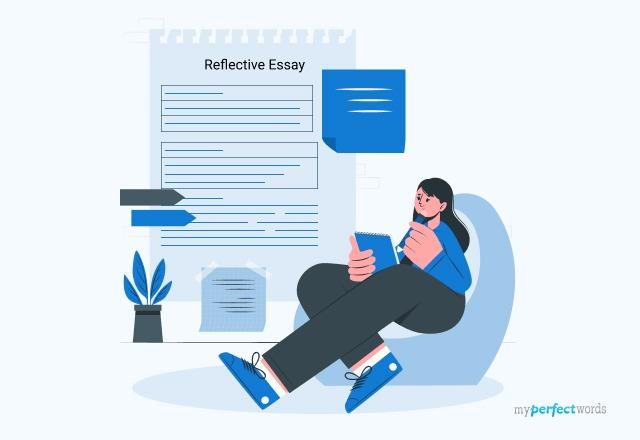
People also read
Reflective Essay: Step-by-Step Guide with Examples & Tips
Good Reflective Essay Topics For Your Paper
Are you struggling with writing a reflective essay, unsure of how to critically examine a life experience and present it effectively?
It can be challenging because a reflective essay requires you to analyze past experiences from your current perspective, diving deep into your thoughts and emotions.
But fear not because in this blog, we're going to provide you with an effective guide on creating a perfect reflective essay outline. With careful planning and organization, you'll discover how to express your personal experiences clearly, making the writing process easy and efficient.
So, let’s start with the blog!
- 1. What is a Reflective Essay Outline?
- 2. How to Write a Reflective Essay Outline?
- 3. Reflective Essay Format and Style
- 4. Reflective Essay Outline Sample
- 5. Reflective Essay Outline Writing Tips
What is a Reflective Essay Outline?
A reflective essay outline is a layout of one’s thoughts and ideas in regard to a specific item. This type of academic writing revolves around a specific response to a topic in the form of a personal reflection. Creating an outline is the first step to a well-written reflective paper.
A reflective essay is similar to a diary entry except for the fact that others will be reading it, so it needs a coherent structure.
What makes reflective essays different from other essay types is the reflective aspect that comes with them. Some of the reflective essay topics include a life experience, a special place, or something you have watched.
Creating an outline prior to the reflective paper is important to organize your thoughts and ideas. Without a well-structured essay outline, it would be very difficult for you to write a perfect and well-organized reflective essay.

Paper Due? Why Suffer? That's our Job!
How to Write a Reflective Essay Outline?
Because the purpose of writing a reflective essay is different from other types of essays , the organization of ideas will also be different. No matter what topic you have chosen, certain rules will always apply.
To organize your thoughts and ideas, create an outline that should include sections for the introduction, body, and conclusion.
Here are the steps that you need to follow to create a perfect reflective essay outline.
1. Reflective Essay Introduction
As with any other type of writing, reflective essays also start with an introduction. The following are the two important parts that an introduction for a reflective essay should include:
It is usually the first statement written to catch the reader’s attention from the beginning. For example, if you are writing a reflective essay about real-life experience, a quick preview of the most exciting part is a good approach to start with.
You can also go through hook examples for an interesting beginning of your reflective essay.
- The Thesis Statement
A thesis statement is a 1-2 sentence statement that describes what your essay is all about. Don’t give too much information in the reflective essay thesis statement, as you will expand on it later.
2. Reflective Essay Body Paragraphs
The next part of the outline is the body section. This can be the hardest part of the entire reflection paper outline. The body section will be very difficult and time-consuming to write if you have not prepared the reflective essay outline first.
Start your body paragraph with a topic sentence to explain its main idea. If you are describing an event, here is what each paragraph of your reflective essay should include.
- First Body Paragraph
The first paragraph will be a description of the event. Don’t forget to answer the ‘who’, ‘what’, ‘why’, ‘where’, and ‘when’ questions. Include the essential information to describe your experience.
For describing an event, a good approach is to follow the chronological order and avoid jumping from one time to another.
- Second Body Paragraph
In the second part, you need to point out the main issues related to the described event. You can also insert quotations and cite sources if the described points can be related to the literature.
- Third Body Paragraph
The third part of your reflection essay will focus on the reflection of your thoughts about the event. This part describes what lessons you have learned as well as insights and ideas that evolved after experiencing the event.
3. Reflective Essay Conclusion
It is the last paragraph of your reflective essay where you need to provide a final touch to the whole writing together. Reiterate the thesis statement and provide a brief summary of the points as well as the overall takeaway from your reflection.
Here are the key elements that you need to add for writing a great essay conclusion paragraph.
- Restate your thesis statement
- Review the main ideas
- Closing sentence
Reflective Essay Outline Template
Here is an outline template you could follow for writing your essay:
Reflective Essay Format and Style
The format of a good reflective essay greatly differs from other types of essays. A reflective essay is more like a well-structured story with insight and personal reflection.
No idea what a self-reflective essay outline format APA or MLA is?
The following are the three most common essay formats that you can use to arrange your reflective essay.
- APA format
- Chicago style
The typical length for a reflection essay is between 400-700 words. Make sure to ask your instructor and employ the correct length and format if it is assigned.
If your instructor asks you to format your reflection paper in MLA style or APA style, here are a few guidelines that you need to follow.
Guidelines for APA Style
- Use Time New Roman.
- Font size 12 should be used.
- One inch margin on all sides of the paper.
- On top of every page, include a page header.
- Add the page number on the right side of the paper.
- The essay in APA should be divided into four parts: the title page, the abstract, the main body section, and references.
Guidelines for MLA Style
- All text should be double-spaced.
- Use Times New Roman.
- The one-inch margin on all sides of the paper.
- Titles should be centered.
- Include your name, your instructor’s name, course name, and date in the header.
- The last page of your essay must include a work cited.
Reflective Essay Outline Sample
You can get help from the following sample template and example to get started with your reflection paper.
Reflective Essay Outline Template
Reflective Essay Outline Example
Reflective Essay Outline Writing Tips
Below, you can find some expert tips for creating a perfect outline for your reflective piece of writing.
- Capture Key Ideas Quickly : Write down your main ideas and key points in a quick and concise manner. Use phrases or short sentences to represent each idea in your outline.
- Start with the Core : Begin your outline with the essential sections: Introduction, Body, and Conclusion. This provides a structural foundation for your reflection.
- Mind the Flow : Ensure that your outline has a logical flow from one section to the next. Each point or idea in the outline should naturally lead to the next one.
- Chunk Similar Ideas : Group together similar ideas or related experiences in the same section. This simplifies the writing process and maintains coherence.
- Focus on Key Details : Don't worry about including every detail in the outline. Instead, prioritize key details and examples that support your main points.
- Use Symbols or Abbreviations : To save time and space, use symbols or abbreviations in your outline, like arrows (?) to indicate transitions or "ex." for examples.
- Think in Questions : Use questions as prompts in your outline. For instance, "What did I learn from this experience?" can guide your reflection in a specific direction.
- Reflective Prompts : Use reflective prompts as subheadings in your outline to guide your thought process. For example, "Why was this experience significant?"
Now, you know how to create an outline for writing a reflective essay. Refer to the above guide to craft a perfect reflective essay structure to achieve the results you need.
Reflective essay writing can be challenging for some, even with all the advice and tips.
Our reflective essay writing service can take care of your reflective essay outline or even the whole writing if you struggle to implement your idea. Our professional writers are available 24/7 to assist you with your ‘ write my essay ’ request.

Write Essay Within 60 Seconds!

Caleb S. has been providing writing services for over five years and has a Masters degree from Oxford University. He is an expert in his craft and takes great pride in helping students achieve their academic goals. Caleb is a dedicated professional who always puts his clients first.

Paper Due? Why Suffer? That’s our Job!
Keep reading


- Cambridge Libraries
Study Skills
Reflective practice toolkit, introduction.
- What is reflective practice?
- Everyday reflection
- Models of reflection
- Barriers to reflection
- Free writing
- Reflective writing exercise
- Bibliography

Many people worry that they will be unable to write reflectively but chances are that you do it more than you think! It's a common task during both work and study from appraisal and planning documents to recording observations at the end of a module. The following pages will guide you through some simple techniques for reflective writing as well as how to avoid some of the most common pitfalls.
What is reflective writing?
Writing reflectively involves critically analysing an experience, recording how it has impacted you and what you plan to do with your new knowledge. It can help you to reflect on a deeper level as the act of getting something down on paper often helps people to think an experience through.
The key to reflective writing is to be analytical rather than descriptive. Always ask why rather than just describing what happened during an experience.
Remember...
Reflective writing is...
- Written in the first person
- Free flowing
- A tool to challenge assumptions
- A time investment
Reflective writing isn't...
- Written in the third person
- Descriptive
- What you think you should write
- A tool to ignore assumptions
- A waste of time
Adapted from The Reflective Practice Guide: an Interdisciplinary Approach / Barbara Bassot.
You can learn more about reflective writing in this handy video from Hull University:
Created by SkillsTeamHullUni
- Hull reflective writing video transcript (Word)
- Hull reflective writing video transcript (PDF)
Where might you use reflective writing?
You can use reflective writing in many aspects of your work, study and even everyday life. The activities below all contain some aspect of reflective writing and are common to many people:
1. Job applications
Both preparing for and writing job applications contain elements of reflective writing. You need to think about the experience that makes you suitable for a role and this means reflection on the skills you have developed and how they might relate to the specification. When writing your application you need to expand on what you have done and explain what you have learnt and why this matters - key elements of reflective writing.
2. Appraisals
In a similar way, undertaking an appraisal is a good time to reflect back on a certain period of time in post. You might be asked to record what went well and why as well as identifying areas for improvement.
3. Written feedback
If you have made a purchase recently you are likely to have received a request for feedback. When you leave a review of a product or service online then you need to think about the pros and cons. You may also have gone into detail about why the product was so good or the service was so bad so other people know how to judge it in the future.
4. Blogging
Blogs are a place to offer your own opinion and can be a really good place to do some reflective writing. Blogger often take a view on something and use their site as a way to share it with the world. They will often talk about the reasons why they like/dislike something - classic reflective writing.
5. During the research process
When researchers are working on a project they will often think about they way they are working and how it could be improved as well as considering different approaches to achieve their research goal. They will often record this in some way such as in a lab book and this questioning approach is a form of reflective writing.
6. In academic writing
Many students will be asked to include some form of reflection in an academic assignment, for example when relating a topic to their real life circumstances. They are also often asked to think about their opinion on or reactions to texts and other research and write about this in their own work.
Think about ... When you reflect
Think about all of the activities you do on a daily basis. Do any of these contain elements of reflective writing? Make a list of all the times you have written something reflective over the last month - it will be longer than you think!
Reflective terminology
A common mistake people make when writing reflectively is to focus too much on describing their experience. Think about some of the phrases below and try to use them when writing reflectively to help you avoid this problem:
- The most important thing was...
- At the time I felt...
- This was likely due to...
- After thinking about it...
- I learned that...
- I need to know more about...
- Later I realised...
- This was because...
- This was like...
- I wonder what would happen if...
- I'm still unsure about...
- My next steps are...
Always try and write in the first person when writing reflectively. This will help you to focus on your thoughts/feelings/experiences rather than just a description of the experience.
Using reflective writing in your academic work

Many courses will also expect you to reflect on your own learning as you progress through a particular programme. You may be asked to keep some type of reflective journal or diary. Depending on the needs of your course this may or may not be assessed but if you are using one it's important to write reflectively. This can help you to look back and see how your thinking has evolved over time - something useful for job applications in the future. Students at all levels may also be asked to reflect on the work of others, either as part of a group project or through peer review of their work. This requires a slightly different approach to reflection as you are not focused on your own work but again this is a useful skill to develop for the workplace.
You can see some useful examples of reflective writing in academia from Monash University , UNSW (the University of New South Wales) and Sage . Several of these examples also include feedback from tutors which you can use to inform your own work.
Laptop/computer/broswer/research by StockSnap via Pixabay licenced under CC0.
Now that you have a better idea of what reflective writing is and how it can be used it's time to practice some techniques.
This page has given you an understanding of what reflective writing is and where it can be used in both work and study. Now that you have a better idea of how reflective writing works the next two pages will guide you through some activities you can use to get started.
- << Previous: Barriers to reflection
- Next: Free writing >>
- Last Updated: Jun 21, 2023 3:24 PM
- URL: https://libguides.cam.ac.uk/reflectivepracticetoolkit
© Cambridge University Libraries | Accessibility | Privacy policy | Log into LibApps
📕 Studying HQ
Ultimate guide to writing a reflective essay, carla johnson.
- June 14, 2023
- Essay Topics and Ideas , How to Guides
Writing about yourself is a powerful way to learn and grow as a person. It is a type of writing that makes you think about your thoughts, feelings, and experiences and how they have affected your personal and professional growth. A reflective essay is a type of writing that lets you talk about your own experiences, thoughts, and insights. In this article , we’ll tell you everything you need to know about writing a reflective essay, from how to define it and figure out what it’s for to how to do it well.
What You'll Learn
Definition of a Reflective Essay
A reflective essay is a type of writing in which you write about your own thoughts, feelings, and experiences. It is a type of personal writing that lets you talk about your own thoughts and experiences and share them with other people. Students are often asked to write reflective essays for school, but they can also be used for personal or professional growth.
Purpose of a Reflective Essay
The goal of a reflective essay is to get you to think about your life and how it has affected your personal and professional growth. Reflective essays can help you learn more about yourself and your experiences, as well as find places where you can grow and improve. They can also help you get better at writing and better at getting your ideas across.
Importance of Reflective Writing
Writing about yourself and your work is an important way to grow personally and professionally. It can help you learn more about yourself, figure out where you need to grow and change, and learn more about how you think and feel. Writing about yourself can also help you get better at critical thinking and analysis , and it can help you get your ideas across better. It is a useful tool for anyone who wants to grow personally and professionally, and it can be used in many different situations, from academic writing to keeping a personal journal.
Writing about yourself and your work is a powerful way to grow personally and professionally. Reflective essays give you a chance to think about your own life and how it has affected your personal and professional growth. By writing about your thoughts and feelings, you can learn more about them, find ways to grow and improve, and improve your writing and communication skills . In the next parts of this article, we’ll show you how to write a good reflective essay step by step, from choosing a topic and organizing your thoughts to writing and revising your essay.
Elements of a Reflective Essay
A reflective essay is a type of writing that allows you to reflect on your personal experiences, thoughts, and feelings. There are several essential elements that should be included in a reflective essay to ensure that it is effective in conveying your personal reflections and experiences.
Personal Reflection
The first essential element of a reflective essay is personal reflection. This involves exploring your own thoughts and feelings about the experience you are reflecting on. It is important to be honest and open about your thoughts and feelings, as this will make your essay more authentic and meaningful.
Description of the Experience
The second element of a reflective essay is a description of the experience that you are reflecting on. This includes providing details about the experience, such as where it took place, who was involved, and what happened. The description should be clear and concise, and should provide enough detail for the reader to understand the context of your reflection.
Analysis of the Experience
The third element of a reflective essay is analysis of the experience. This involves exploring the experience in more depth, and examining your thoughts and feelings about it. You should consider what you learned from the experience, and how it impacted your personal and professional growth .
Evaluation of the Experience
The fourth element of a reflective essay is evaluation of the experience. This involves examining the experience from different perspectives, and considering its strengths and weaknesses. You should reflect on what you would do differently if you were in the same situation again, and how you could improve your response or approach.
Identification of Key Learning
The fifth element of a reflective essay is identifying the key learning that you gained from the experience. This involves reflecting on the insights and lessons that you learned from the experience, and how these have impacted your personal and professional growth. This can include new skills, knowledge, or perspectives that you gained from the experience.
Planning for Future Action
The final element of a reflective essay is planning for future action. This involves considering how you can apply the lessons and insights gained from the experience to improve your future actions. You should reflect on how you can use what you learned to approach similar situations differently in the future.
How to Write a Reflective Essay
Writing a reflective essay can be a challenging task, but by following a few simple steps, you can write an effective and meaningful essay .
Steps for Writing a Reflective Essay:
1. Brainstorming and Selecting a Topic
Begin by brainstorming and selecting a topic for your reflective essay. Think about a personal experience or event that had a significant impact on your personal or professional growth.
2. Creating an Outline
Create an outline for your essay . This should include an introduction, body, and conclusion, as well as sections for each of the essential elements described above.
3. Writing the Introduction
Write the introduction for your essay . This should include a brief overview of the experience that you will be reflecting on, as well as the purpose and focus of your essay.
4. Writing the Body
Write the body of your essay, which should include the personal reflection, description of the experience, analysis of the experience, evaluation of the experience, identification of key learning, and planning for future action . Make sure to use specific examples and details to support your reflection.
5. Writing the Conclusion
Write the conclusion for your essay , which should summarize the key points of your reflection and provide closure for the reader. You can also include a final reflection on the experience and what it means to you.
6. Revising and Editing
Pay close attention to grammar, spelling, and sentence structure as you reread and edit your essay . Make sure your essay is easy to read and flows well. You might also want someone else to look over your essay and give you feedback and ideas.
If you follow these steps, you should be able to write a good reflective essay. Remember to be honest and open about your thoughts and feelings, and to support your reflection with specific examples and details. You can become a good reflective writer with practice , and you can use this skill to help your personal and professional growth.
Reflective Essay Topics
Reflective essays can be written on a wide range of topics, as they are based on personal experiences and reflections. Here are some common categories of reflective essay topics:
Personal Experiences
– A time when you overcame a personal challenge
– A difficult decision you had to make
– A significant event in your life that changed you
– A moment when you learned an important lesson
– A relationship that had a significant impact on you
Professional Experiences
– A challenging project or assignment at work
– A significant accomplishment or success in your career
– A time when you had to deal with a difficult colleague or boss
– A failure or setback in your career and what you learned from it
– A career change or transition that had a significant impact on you
Academic Experiences
– A challenging course or assignment in school
– A significant accomplishment or success in your academic career
– A time when you struggled with a particular subject or topic and how you overcame it
– A research project or paper that had a significant impact on you
– A teacher or mentor who had a significant impact on your academic career
Cultural Experiences
– A significant trip or travel experience
– A significant cultural event or celebration you participated in
– A time when you experienced culture shock
– A significant interaction with someone from a different culture
– A time when you learned something new about a different culture and how it impacted you
Social Issues
– A personal experience with discrimination or prejudice
– A time when you volunteered or worked for a social cause or organization
– A significant event or moment related to a social issue (e.g. protest, rally, community event)
– A time when you had to confront your own biases or privilege
– A social issue that you are passionate about and how it has impacted you personally
Reflective Essay Examples
Example 1: Reflecting on a Personal Challenge
In this reflective essay, the writer reflects on a personal challenge they faced and how they overcame it. They explore their thoughts, feelings, and actions during this time, and reflect on the lessons they learned from the experience.
Example 2: Reflecting on a Professional Experience
In this reflective essay, the writer reflects on a challenging project they worked on at work and how they overcame obstacles to successfully complete it. They explore their thoughts and feelings about the experience and reflect on the skills and knowledge they gained from it.
Example 3: Reflecting on an Academic Assignment
In this reflective essay, the writer reflects on a challenging academic assignment they completed and how they overcame difficulties to successfully complete it. They explore their thoughts and feelings about the experience and reflect on the skills and knowledge they gained from it.
Example 4: Reflecting on a Cultural Experience
In this reflective essay, the writer reflects on a significant cultural experience they had, such as traveling to a new country or participating in a cultural event. Theyexplore their thoughts and feelings about the experience, reflect on what they learned about the culture, and how it impacted them personally.
Example 5: Reflecting on a Social Issue
In this reflective essay, the writer reflects on their personal experiences with discrimination or prejudice and how it impacted them. They explore their thoughts and feelings about the experience, reflect on what they learned about themselves and the issue, and how they can take action to address it.
These examples demonstrate how reflective essays can be used to explore a wide range of personal experiences and reflections. By exploring your own thoughts and feelings about an experience, you can gain insights into your personal and professional growth and identify areas for further development . Reflective writing is a powerful tool for self-reflection and personal growth, and it can be used in many different contexts to help you gain a deeper understanding of yourself and the world around you.
Reflective Essay Outline
A reflective essay should follow a basic outline that includes an introduction, body, and conclusion. Here is a breakdown of each section:
Introduction: The introduction should provide an overview of the experience you will be reflecting on and a preview of the key points you will be discussing in your essay .
Body: The body of the essay should include several paragraphs that explore your personal reflection, description of the experience, analysis of the experience, evaluation of the experience, identification of key learning, and planning for future action.
Conclusion: The conclusion should summarize the key points of your reflection and provide closure for the reader.
Reflective Essay Thesis
A reflective essay thesis is a statement that summarizes the main points of your essay and provides a clear focus for your writing. A strong thesis statement is essential for a successful reflective essay, as it helps to guide your writing and ensure that your essay is focused and coherent.
Importance of a Strong Thesis Statement
A strong thesis statement is important for several reasons. First, it provides a clear focus for your writing, which helps to ensure that your essay is coherent and well-organized. Second, it helps to guide your writing and ensure that you stay on topic throughout your essay . Finally, it helps to engage your reader and provide them with a clear understanding of what your essay is about.
Tips for Writing a Thesis Statement
To write a strong thesis statement for your reflective essay, follow these tips:
– Be clear and concise: Yourthesis statement should clearly state the main focus and purpose of your essay in a concise manner.
– Use specific language: Use specific language to describe the experience you will be reflecting on and the key points you will be discussing in your essay .
– Make it arguable: A strong thesis statement should be arguable and provide some insight or perspective on the experience you are reflecting on.
– Reflect on the significance: Reflect on the significance of the experience you are reflecting on and why it is important to you.
Reflective Essay Structure
The structure of a reflective essay is important for ensuring that your essay is well-organized and easy to read. A clear structure helps to guide the reader through your thoughts and reflections, and it makes it easier for them to understand your main points.
The Importance of a Clear Structure
A clear structure is important for several reasons. First, it helps to ensure that your essay is well-organized and easy to read. Second, it helps to guide your writing and ensure that you stay on topic throughout your essay. Finally, it helps to engage your reader and provide them with a clear understanding of the key points you are making.
Tips for Structuring a Reflective Essay
To structure your reflective essay effectively, follow these tips:
– Start with an introduction that provides an overview of the experience you are reflecting on and a preview of the key points you will be discussing in your essay .
– Use body paragraphs to explore your personal reflection, description of the experience, analysisof the experience, evaluation of the experience, identification of key learning, and planning for future action. Ensure that each paragraph has a clear focus and supports your thesis statement .
– Use transition words and phrases to connect your paragraphs and make your essay flow smoothly.
– End your essay with a conclusion that summarizes the key points of your reflection and provides closure for the reader.
– Consider using subheadings to organize your essay and make it more structured and easy to read.
By following these tips, you can create a clear and well-structured reflective essay that effectively communicates your personal experiences and reflections. Remember to use specific examples and details to support your reflection, and to keep your focus on the main topic and thesis statement of your essay .
Frequently Asked Questions (FAQs)
1. what is a reflective essay.
A reflective essay is a type of writing that allows you to reflect on your personal experiences, thoughts, and feelings. It involves exploring your own thoughts and feelings about an experience, and reflecting on what you learned from it.
2. What are the elements of a reflective essay?
The essential elements of a reflective essay include personal reflection, description of the experience, analysis of the experience, evaluation of the experience, identification of key learning, and planning for future action.
3. How do I choose a topic for a reflective essay?
To choose a topic for a reflective essay, think about a personal experience or event that had a significant impact on your personal or professional growth. You may also consider professional experiences, academic experiences, cultural experiences, or social issues that have impacted you personally.
Reflective writing is a powerful tool for personal and professional development. By exploring your own thoughts and feelings about an experience, you can gain insights into your personal and professional growth and identify areas for further development. To write an effective reflective essay, it is important to follow a clear structure, use specific examples and details to support your reflection, and stay focused on the main topic and thesis statement of your essay . By following these tips and guidelines, you can become a skilled reflective writer and use this tool to improve your personal and professional growth.
Start by filling this short order form order.studyinghq.com
And then follow the progressive flow.
Having an issue, chat with us here
Cathy, CS.
New Concept ? Let a subject expert write your paper for You
Have a subject expert write for you now, have a subject expert finish your paper for you, edit my paper for me, have an expert write your dissertation's chapter, popular topics.
Business StudyingHq Essay Topics and Ideas How to Guides Samples
- Nursing Solutions
- Study Guides
- Free Study Database for Essays
- Privacy Policy
- Writing Service
- Discounts / Offers
Study Hub:
- Studying Blog
- Topic Ideas
- How to Guides
- Business Studying
- Nursing Studying
- Literature and English Studying

Writing Tools
- Citation Generator
- Topic Generator
- Paraphrasing Tool
- Conclusion Maker
- Research Title Generator
- Thesis Statement Generator
- Summarizing Tool
- Terms and Conditions
- Confidentiality Policy
- Cookies Policy
- Refund and Revision Policy
Our samples and other types of content are meant for research and reference purposes only. We are strongly against plagiarism and academic dishonesty.
Contact Us:
📞 +15512677917
2012-2024 © studyinghq.com. All rights reserved
Reflective Essay Guide
Writing Reflective Essay
Last updated on: Feb 9, 2023
A Step by Step Guide to Writing a Reflective Essay
By: John K.
Reviewed By: Jacklyn H.
Published on: May 11, 2021

If you have been assigned the task of writing a reflective essay, it will be an excellent opportunity to polish your creativity and writing skills.
A reflective essay is slightly different from other essays as it requires a personal point of view of a chosen subject. Thus, you need to analyze a particular subject with your personal experience, understanding, and knowledge.
The only key to write a reflective paper is that you need to be more expressive. The more expressive you are, the merrier it will be for your essay. Feel free to talk about life experiences that are valid to your topic. Writing your reflections can actually be a strength in this kind of essay.
If this sounds like something that interests or concerns you, then keep reading! This blog contains every detail necessary to produce an impressive reflective essay.

On this Page
What Is a Reflective Essay?
A reflective essay describes an experience or event and analyzes the meaning of that particular experience and the lessons it delivers. One thing that makes it a reflective essay is that the writer analyzes an event of the past from the present.
When writing a reflective essay, you are required to open up about your emotions and thoughts to paint a clear picture of your personality, history, and individual traits.
It is required that you include a description and a vivid summary of the experience; it will make the reader feel that he has experienced it as well. Moreover, you need to explain your reactions, thoughts, feelings, and emotions.
A good reflective paper should be creative, insightful, and authentic. It needs to express your opinions on a specific topic interestingly so that the reader wants to follow what you're saying without getting bored or leaving it before reading.
Reflective Essay Format
REFLECTIVE ESSAY FORMAT AND TEMPLATE
How to Start a Reflective Essay?
Writing a great reflective essay is a chance to polish your skills of writing and enhance your creativity. However, sometimes, it gets difficult and confusing to write it. There are many high schools as well as college students who get confused thinking where to start.
So, we have compiled some steps that will help you to write a perfect essay.
Let’s discuss them in detail.
1. Choose Your Topic Carefully
If you are given the freedom to choose a topic and don’t have any idea regarding it, the best way is to brainstorm and research some trending and good topic ideas. Unfortunately, a common mistake when writing a reflective essay is to choose a topic that is too broad or too narrow.
2. Research About Your Subject
Make sure you do thorough research on your topic first. Close your eyes and start imagining or remembering. Then, watch, listen, and read the information regarding your topic.
3. Brainstorm
Before you even start writing, brainstorm your ideas first. It is always a wise step to take before writing anything.
4. Choose Reflection Questions
Take a look at the questions below to get a better idea:
- What did I notice?
- What do I feel about it?
- Why am I feeling this way?
5. Answer the Questions You Have Chosen
After selecting your questions, you need to give their answers. Start from one essay question; make sure you answer it properly. After that, head on to the next one.
6. Recognize Your Experience Meaning
Before you even start writing, you need to choose the most significant lesson you have learned from your experience. This “most significant lesson or thing” is going to be the thesis of your essay.
7. Follow the Structure
Like all the other essays, the reflective essay also has the same format, which comprises the introduction, body, and conclusion paragraph.
Therefore, follow these steps and makes your essay writing process easy.

Paper Due? Why Suffer? That's our Job!
How to Write a Reflective Essay?
Here are some steps that you should follow when you start writing your reflective paper.
1. Write the Introduction
To understand and know how to start a reflective essay introduction, you must first understand that an introduction is a piece of brief information about the main topic and its background.
In the reflective essay introduction, you will recognize the subject and provide the reader with an overview of the impression you have taken from it. Therefore, the introductory paragraph of your reflective essay needs to include a thesis statement that will act as a focal point of your paper.
2. Body Paragraphs
The first body paragraph should mention the impactful impression your subject has made on you. Then, provide relevant facts to support your thesis statement.
Moreover, the body of your essay will also describe most of the ideas you touched on in your introduction.
3. Write a Conclusion
Restate your thesis statement and summarize all the reasons you have mentioned in the essay’s body paragraphs. After that, sum up your essay with your final thoughts on the subject; close your essay with some reflective thoughts.
4. Proofread and Edit
Never submit your essay without editing or proofreading. Even though you have spent hours of effort and put a lot of hard work in doing your essay, your essay will have no worth if you haven’t proofread and edited it.
Here is the reflective essay outline sample for your ease.
Reflective Essay Outline
REFLECTIVE ESSAY OUTLINE
Reflective Essay Examples
We have compiled some perfect reflective essay examples below to help you get started on your paper.
Personal Reflective Essay Examples
PERSONAL REFLECTIVE ESSAY EXAMPLES
ENGLISH REFLECTIVE ESSAY EXAMPLES
Tough Essay Due? Hire Tough Writers!
Reflective Essay Topics
Check out these reflective essay ideas on the most common subjects you can write about:
- Something from your imagination
- Something you have experienced in real
- A special object
- Something you have seen, heard, read, watched, touched, or smelled.
We are sure these subjects must have sparked your imagination, but here are a few essay topics that will help you get the bigger picture. In addition, these topics will help you understand the kind of topics teachers like to assign.
- The desert, mountains, countryside, or beach
- A special room or hideaway
- The house you grew up
- Home of some relative
- A person that taught me how to improve reflective writing skills
- New Experiences
- When your piece of writing published
- Important conversation
- The older man line of thought
- The time you overcame your fears
A list of topics will help you get a picture of what good ideas are like and how to come up with one of your own.
5StarEssays.com is the best essay writing service online with exceptional quality work and insanely affordable rates. In addition, our round-the-clock customer support is ready to help you out with your academic growth.
Your essays are assigned to highly qualified essay writers who have years of experience and education. They make sure to provide you with mind-blowing, error-free, and on-time essays. They don’t just cater to the reflective essay but help with all types of essays.
So, contact us now and get the best write my essay for me? service at affordable rates.
Frequently Asked Questions
How long is a reflective essay.
The reflective essay should be between 300 and 500 words. However, it will vary according to the chosen topic.
What is the purpose of a reflective essay?
A reflective essay is a great opportunity for the author to explore what has happened in their life and show how this specific event may have changed them.

PhD Essay, Literature
John K. is a professional writer and author with many publications to his name. He has a Ph.D. in the field of management sciences, making him an expert on the subject matter. John is highly sought after for his insights and knowledge, and he regularly delivers keynote speeches and conducts workshops on various topics related to writing and publishing. He is also a regular contributor to various online publications.
Was This Blog Helpful?
Keep reading.
- Best Reflective Essay Topics Recommended by Experts

People Also Read
- how to write an abstract
- essay writing tips
- writing research proposal
- types of plagiarism
- persuasive essay examples
Burdened With Assignments?

Advertisement
- Homework Services: Essay Topics Generator
© 2024 - All rights reserved
Reflective Essay
Reflective Essay Outline

Reflective Essay Outline - Samples & Template
Published on: Oct 3, 2020
Last updated on: Jan 31, 2024

People also read
Reflective Essay - Writing Steps with Examples, Tips, and Topics
Best Reflective Essay Topics & Ideas for Students
Share this article
On This Page On This Page -->
The best essay starts with the perfect essay outline. An essay outline helps to get everything in order. It is the layout of oneâs thoughts and ideas related to the specific topic. With an outline, you can easily structure it properly.
Here is a guide that helps you in creating the perfect reflective essay outline.
Creating the essay outline for a reflective essay is like getting your thoughts in order. It works as an essay bone structure. An essay outline is a way of organizing thoughts and ideas in one place.
Writing the outline is the first step of a well-written essay. An outline helps in your entire essay, and you donât forget the essayâs main points.
An outline gives you a clear roadmap and saves your writing time. With the outlineâs help, you wonât struggle to remember the important points of the essay.
An outline helps from the start to the end of the essay, and you can easily finish the essay before the deadline. Collect all information and create a well-structured essay outline. Without a perfect outline, you would never create a good college essay and make it difficult for you.
The structure of the college essay depends on the topic and purpose of the essay. A properly structured outline will help you to present the necessary information in the essay easily. When writing the reflective essay outline, keep some key points in mind, and create the perfect essay.
- Describe the significance of the essay
- Identify personal intentions and link them with previous experiences.
- Think about future options
- Recognize your own beliefs
- Organize information in a sensible manner.
- Categorize the main points
Tough Essay Due? Hire a Writer!

How to Write a Reflective Essay Outline?
Writing a reflective essay is a way of describing your personal experience and explain how those life experiences influenced and how they changed your lives.
When writing the outline, one thing to keep in mind is the chronological order. Explain all the events in logical order. Creating a good outline will make your essay writing phase easy and quicker.
When you start creating the college essay outline, make sure you include three sections i.e., introduction, body, and conclusion.
- Attention-grabbing hook
- Overview of the topic
- Thesis statement
- Paragraph 1 with a detailed description of the event, person, or place
- Paragraph 2 with a description of thoughts and feelings
- Paragraph 3 with analysis and evaluation of the experience
- Summary of the essay
- Restate the thesis statement

Letâs discuss them in detail.
The essay introduction is based on your experiences, feelings, and situations. When you start writing the reflective paper introduction, focus on the main parts that make your introduction a good one.
The introduction part of the essay should start with an attention-grabbing hook statement. It is a statement that grabs the readerâs attention. A great hook statement makes the readers want to read more.
It is the first statement that the reader read and decide to read the entire essay or not. The hook statement should start with a quote or an interesting question.
The introduction is a small overview of the reflection essay topic. Briefly mention the main points related to the topic. In this section, you need to communicate directly with the purpose of the essay. The first few sentences give a glimpse of the big picture that you reveal in the body paragraphs.
The thesis statement describes what the essay is all about. It is your entire essayâs core statement, and it is called âreflective essay thesis.â The thesis statement is all about places, events, experiences, and thoughts described further in the essay.
The body paragraph is the next section after the introduction. Writing the body paragraphs is sometimes time-consuming if you have not prepared the perfect outline.
Start the body paragraph with a topic sentence and explain the main idea. The reflective essay body paragraph is categorized into three paragraphs, like other essays.
In the first body paragraph, describe the event, person, or place. But describe all the events in chronological order so the reader easily understands. Not define the events in the body paragraphs without any order.
Describe the main issues related to the topic. Use quotations and cite sources related to the literature. Include precise examples of the events that occurred during this period.
The third part will be related to your personal reflections about the event. You need to add supporting details about the event and make a successful essay. In this paragraph, you describe what lessons you have learned after experiencing the event.
The essayâs conclusion paragraph should be the finishing touch that brings the complete piece of the writing together. It contains two parts that make the essay successful.
The conclusion wraps the entire essay but does not add irrelevant details. Only add important points in the essay. It is the final part that the reader reads, so make it strong and powerful. In this part, encourage the reader to do further research.
In conclusion, restate the thesis statement and rewrite the main points. It is the closing part of the essay, and it must be concise. Inform the reader of your final opinion about the topic.
Reflective Essay Outline Format
The reflective essay format is different from other essays. It is a type of writing in which an essay writer uses the MLA format or APA style.
In APA style, you should consider a few points:
- Use Time New Roman
- The font size is 12, and all text should be double-spaced.
- The page number is located at the top right corner of the page.
- The title page, abstract, main body, and references are the main parts of the essay.
Similarly APA format, you should consider a few points in MLA format:
- The font size is 12.
- All the titles of the essay should be centered.
- Your paperâs header should have your name, course number, professor's name, and date.
- On the last page of the essay, include the cited work.
Reflective Essay Outline Template
Creating a good outline is necessary for all essays. Without an outline, you will not complete your essay on time. Here is a template that will help you in creating a good reflective essay.
Reflective Essay Outline Examples
If you write the reflective essay for the first time, get help from these examples and craft a good essay. These examples will help in your writing the perfect reflective essay.
Example of Reflective Essay
Personal Reflective Essay
Reflective Essay Example About Travel
Tips on Writing the Reflective Essay
The outline is the backbone of the essay. For writing the perfect essay, you have to create the outline. Here are some tips that you should follow when writing a reflective essay.
- Use the outline for your daily entries.
- Avoid repetitive sentences in the essay.
- State your own opinion in the essay.
- Make sure that you have supported every moment that seemed unclear to you before.
- Use transition words between paragraphs.
- Include all the key points in the outline.
- Donât use complex words in the essay and present your point of view.
- Know the strong points that you need to showcase in the essay.
- Proofread and edit the essay before submitting or publishing it.
Reflective essay writing might be tough, but you can easily write the essay with the right outline. Some students have too little time, and they are overloaded with essay writing tasks. They cannot give appropriate time to essay writing.
Achieve academic excellence effortlessly with our professional essay writing service . Our team of seasoned writers is dedicated to delivering outstanding results that exceed your expectations.
Elevate your writing with our innovative AI essay writing tool . Click here to unlock your full academic potential.
Barbara P (Literature, Marketing)
Barbara is a highly educated and qualified author with a Ph.D. in public health from an Ivy League university. She has spent a significant amount of time working in the medical field, conducting a thorough study on a variety of health issues. Her work has been published in several major publications.
Paper Due? Why Suffer? That’s our Job!

Keep reading

Legal & Policies
- Privacy Policy
- Cookies Policy
- Terms of Use
- Refunds & Cancellations
- Our Writers
- Success Stories
- Our Guarantees
- Affiliate Program
- Referral Program
- AI Essay Writer
Disclaimer: All client orders are completed by our team of highly qualified human writers. The essays and papers provided by us are not to be used for submission but rather as learning models only.
- Jump to menu
- Student Home
- Accept your offer
- How to enrol
- Student ID card
- Set up your IT
- Orientation Week
- Fees & payment
- Academic calendar
- Special consideration
- Transcripts
- The Nucleus: Student Hub
- Referencing
- Essay writing
- Learning abroad & exchange
- Professional development & UNSW Advantage
- Employability
- Financial assistance
- International students
- Equitable learning
- Postgraduate research
- Health Service
- Events & activities
- Emergencies
- Volunteering
- Clubs and societies
- Accommodation
- Health services
- Sport and gym
- Arc student organisation
- Security on campus
- Maps of campus
- Careers portal
- Change password
Examples of Reflective Writing
Types of reflective writing assignments.
A journal requires you to write weekly entries throughout a semester. May require you to base your reflection on course content.
A learning diary is similar to a journal, but may require group participation. The diary then becomes a place for you to communicate in writing with other group members.
A logbook is often used in disciplines based on experimental work, such as science. You note down or 'log' what you have done. A log gives you an accurate record of a process and helps you reflect on past actions and make better decisions for future actions.
A reflective note is often used in law. A reflective note encourages you to think about your personal reaction to a legal issue raised in a course.
An essay diary can take the form of an annotated bibliography (where you examine sources of evidence you might include in your essay) and a critique (where you reflect on your own writing and research processes).
a peer review usually involves students showing their work to their peers for feedback.
A self-assessment task requires you to comment on your own work.
Some examples of reflective writing
Social science fieldwork report (methods section), engineering design report, learning journal (weekly reflection).
Brookfield, S 1987, Developing critical thinkers: challenging adults to explore alternative ways of thinking and acting , Open University Press, Milton Keynes.
Mezirow, J 1990, Fostering critical reflection in adulthood: a guide to transformative and emancipatory learning , Jossey-Bass, San Francisco.
Schön, DA 1987, Educating the reflective practitioner , Jossey-Bass. San Francisco.
We thank the students who permitted us to feature examples of their writing.
Prepared by Academic Skills, UNSW. This guide may be distributed or adapted for educational purposes. Full and proper acknowledgement is required.
Essay and assignment writing guide
- Essay writing basics
- Essay and assignment planning
- Answering assignment questions
- Editing checklist
- Writing a critical review
- Annotated bibliography
- How do I write reflectively?
- Examples of reflective writing
- ^ More support
Study Hacks Workshops | All the hacks you need! 7 Feb – 10 Apr 2024

What Is Reflective Writing? (Explained W/ 20+ Examples)
I’ll admit, reflecting on my experiences used to seem pointless—now, I can’t imagine my routine without it.
What is reflective writing?
Reflective writing is a personal exploration of experiences, analyzing thoughts, feelings, and learnings to gain insights. It involves critical thinking, deep analysis, and focuses on personal growth through structured reflection on past events.
In this guide, you’ll learn everything you need to know about reflective writing — with lots of examples.
What Is Reflective Writing (Long Description)?

Table of Contents
Reflective writing is a method used to examine and understand personal experiences more deeply.
This kind of writing goes beyond mere description of events or tasks.
Instead, it involves looking back on these experiences, analyzing them, and learning from them.
It’s a process that encourages you to think critically about your actions, decisions, emotions, and responses.
By reflecting on your experiences, you can identify areas for improvement, make connections between theory and practice, and enhance your personal and professional development. Reflective writing is introspective, but it should also be analytical and critical.
It’s not just about what happened.
It’s about why it happened, how it affected you, and what you can learn from it.
This type of writing is commonly used in education, professional development, and personal growth, offering a way for individuals to gain insights into their personal experiences and behaviors.
Types of Reflective Writing
Reflective writing can take many forms, each serving different purposes and providing various insights into the writer’s experiences.
Here are ten types of reflective writing, each with a unique focus and approach.
Journaling – The Daily Reflection
Journaling is a type of reflective writing that involves keeping a daily or regular record of experiences, thoughts, and feelings.
It’s a private space where you can freely express yourself and reflect on your day-to-day life.
Example: Today, I realized that the more I try to control outcomes, the less control I feel. Letting go isn’t about giving up; it’s about understanding that some things are beyond my grasp.
Example: Reflecting on the quiet moments of the morning, I realized how much I value stillness before the day begins. It’s a reminder to carve out space for peace in my routine.
Learning Logs – The Educational Tracker
Learning logs are used to reflect on educational experiences, track learning progress, and identify areas for improvement.
They often focus on specific learning objectives or outcomes.
Example: This week, I struggled with understanding the concept of reflective writing. However, after reviewing examples and actively engaging in the process, I’m beginning to see how it can deepen my learning.
Example: After studying the impact of historical events on modern society, I see the importance of understanding history to navigate the present. It’s a lesson in the power of context.
Critical Incident Journals – The Turning Point
Critical incident journals focus on a significant event or “critical incident” that had a profound impact on the writer’s understanding or perspective.
These incidents are analyzed in depth to extract learning and insights.
Example: Encountering a homeless person on my way home forced me to confront my biases and assumptions about homelessness. It was a moment of realization that has since altered my perspective on social issues.
Example: Missing a crucial deadline taught me about the consequences of procrastination and the value of time management. It was a wake-up call to prioritize and organize better.
Project Diaries – The Project Chronicle
Project diaries are reflective writings that document the progress, challenges, and learnings of a project over time.
They provide insights into decision-making processes and project management strategies.
Example: Launching the community garden project was more challenging than anticipated. It taught me the importance of community engagement and the value of patience and persistence.
Example: Overcoming unexpected technical issues during our project showed me the importance of adaptability and teamwork. Every obstacle became a stepping stone to innovation.
Portfolios – The Comprehensive Showcase
Portfolios are collections of work that also include reflective commentary.
They showcase the writer’s achievements and learning over time, reflecting on both successes and areas for development.
Example: Reviewing my portfolio, I’m proud of how much I’ve grown as a designer. Each project reflects a step in my journey, highlighting my evolving style and approach.
Example: As I added my latest project to my portfolio, I reflected on the journey of my skills evolving. Each piece is a chapter in my story of growth and learning.
Peer Reviews – The Collaborative Insight
Peer reviews involve writing reflectively about the work of others, offering constructive feedback while also considering one’s own learning and development.
Example: Reviewing Maria’s project, I admired her innovative approach, which inspired me to think more creatively about my own work. It’s a reminder of the value of diverse perspectives.
Example: Seeing the innovative approach my peer took on a similar project inspired me to rethink my own methods. It’s a testament to the power of sharing knowledge and perspectives.
Personal Development Plans – The Future Blueprint
Personal development plans are reflective writings that outline goals, strategies, and actions for personal or professional growth.
They include reflections on strengths, weaknesses, opportunities, and threats.
Example: My goal to become a more effective communicator will require me to step out of my comfort zone and seek opportunities to speak publicly. It’s daunting but necessary for my growth.
Example: Identifying my fear of public speaking in my plan pushed me to take a course on it. Acknowledging weaknesses is the first step to turning them into strengths.
Reflective Essays – The Structured Analysis
Reflective essays are more formal pieces of writing that analyze personal experiences in depth.
They require a structured approach to reflection, often including theories or models to frame the reflection.
Example: Reflecting on my leadership role during the group project, I applied Tuckman’s stages of group development to understand the dynamics at play. It helped me appreciate the natural progression of team development.
Example: In my essay, reflecting on a failed project helped me understand the role of resilience in success. Failure isn’t the opposite of success; it’s part of its process.
Reflective Letters – The Personal Correspondence
Reflective letters involve writing to someone (real or imagined) about personal experiences and learnings.
It’s a way to articulate thoughts and feelings in a structured yet personal format.
Example: Dear Future Self, Today, I learned the importance of resilience. Faced with failure, I found the strength to persevere a nd try again. This lesson, I hope, will stay with me as I navigate the challenges ahead.
Example: Writing a letter to my past self, I shared insights on overcoming challenges with patience and persistence. It’s a reminder of how far I’ve come and the hurdles I’ve overcome.
Blogs – The Public Journal
Blogs are a form of reflective writing that allows writers to share their experiences, insights, and learnings with a wider audience.
They often combine personal narrative with broader observations about life, work, or society.
Example: In my latest blog post, I explored the journey of embracing vulnerability. Sharing my own experiences of failure and doubt not only helped me process these feelings but also connected me with readers going through similar struggles. It’s a powerful reminder of the strength found in sharing our stories.
Example: In a blog post about starting a new career path, I shared the fears and excitement of stepping into the unknown. It’s a journey of self-discovery and embracing new challenges.
What Are the Key Features of Reflective Writing?
Reflective writing is characterized by several key features that distinguish it from other types of writing.
These features include personal insight, critical analysis, descriptive narrative, and a focus on personal growth.
- Personal Insight: Reflective writing is deeply personal, focusing on the writer’s internal thoughts, feelings, and reactions. It requires introspection and a willingness to explore one’s own experiences in depth.
- Critical Analysis: Beyond simply describing events, reflective writing involves analyzing these experiences. This means looking at the why and how, not just the what. It involves questioning, evaluating, and interpreting your experiences in relation to yourself, others, and the world.
- Descriptive Narrative: While reflective writing is analytical, it also includes descriptive elements. Vivid descriptions of experiences, thoughts, and feelings help to convey the depth of the reflection.
- Focus on Growth: A central aim of reflective writing is to foster personal or professional growth. It involves identifying lessons learned, recognizing patterns, and considering how to apply insights gained to future situations.
These features combine to make reflective writing a powerful tool for learning and development.
It’s a practice that encourages writers to engage deeply with their experiences, challenge their assumptions, and grow from their reflections.
What Is the Structure of Reflective Writing?
The structure of reflective writing can vary depending on the context and purpose, but it typically follows a general pattern that facilitates deep reflection.
A common structure includes an introduction, a body that outlines the experience and the reflection on it, and a conclusion.
- Introduction: The introduction sets the stage for the reflective piece. It briefly introduces the topic or experience being reflected upon and may include a thesis statement that outlines the main insight or theme of the reflection.
- Body: The body is where the bulk of the reflection takes place. It often follows a chronological order, detailing the experience before moving into the reflection. This section should explore the writer’s thoughts, feelings, reactions, and insights related to the experience. It’s also where critical analysis comes into play, examining causes, effects, and underlying principles.
- Conclusion: The conclusion wraps up the reflection, summarizing the key insights gained and considering how these learnings might apply to future situations. It’s an opportunity to reflect on personal growth and the broader implications of the experience.
This structure is flexible and can be adapted to suit different types of reflective writing.
However, the focus should always be on creating a coherent narrative that allows for deep personal insight and learning.
How Do You Start Reflective Writing?
Starting reflective writing can be challenging, as it requires diving into personal experiences and emotions.
Here are some tips to help initiate the reflective writing process:
- Choose a Focus: Start by selecting an experience or topic to reflect upon. It could be a specific event, a general period in your life, a project you worked on, or even a book that made a significant impact on you.
- Reflect on Your Feelings: Think about how the experience made you feel at the time and how you feel about it now. Understanding your emotional response is a crucial part of reflective writing.
- Ask Yourself Questions: Begin by asking yourself questions related to the experience. What did you learn from it? How did it challenge your assumptions? How has it influenced your thinking or behavior?
- Write a Strong Opening: Your first few sentences should grab the reader’s attention and clearly indicate what you will be reflecting on. You can start with a striking fact, a question, a quote, or a vivid description of a moment from the experience.
- Keep It Personal: Remember that reflective writing is personal. Use “I” statements to express your thoughts, feelings, and insights. This helps to maintain the focus on your personal experience and learning journey.
Here is a video about reflective writing that I think you’ll like:
Reflective Writing Toolkit
Finding the right tools and resources has been key to deepening my reflections and enhancing my self-awareness.
Here’s a curated toolkit that has empowered my own reflective practice:
- Journaling Apps: Apps like Day One or Reflectly provide structured formats for daily reflections, helping to capture thoughts and feelings on the go.
- Digital Notebooks: Tools like Evernote or Microsoft OneNote allow for organized, searchable reflections that can include text, images, and links.
- Writing Prompts: Websites like WritingPrompts.com offer endless ideas to spark reflective writing, making it easier to start when you’re feeling stuck.
- Mind Mapping Software: Platforms like MindMeister help organize thoughts visually, which can be especially helpful for reflective planning or brainstorming.
- Blogging Platforms: Sites like WordPress or Medium offer a space to share reflective writings publicly, fostering community and feedback. You’ll need a hosting platform. I recommend Bluehost or Hostarmada for beginners.
- Guided Meditation Apps: Apps such as Headspace or Calm can support reflective writing by clearing the mind and fostering a reflective state before writing.
- Audio Recording Apps: Tools like Otter.ai not only allow for verbal reflection but also transcribe conversations, which can then be reflected upon in writing.
- Time Management Apps: Resources like Forest or Pomodoro Technique apps help set dedicated time for reflection, making it a regular part of your routine.
- Creative Writing Software: Platforms like Scrivener cater to more in-depth reflective projects, providing extensive organizing and formatting options.
- Research Databases: Access to journals and articles through databases like Google Scholar can enrich reflective writing with theoretical frameworks and insights.
Final Thoughts: What Is Reflective Writing?
Reflective writing, at its core, is a deeply personal practice.
Yet, it also holds the potential to bridge cultural divides. By sharing reflective writings that explore personal experiences through the lens of different cultural backgrounds, we can foster a deeper understanding and appreciation of diverse worldviews.
Read This Next:
- What Is a Prompt in Writing? (Ultimate Guide + 200 Examples)
- What Is A Personal Account In Writing? (47 Examples)
- Why Does Academic Writing Require Strict Formatting?
- What Is A Lens In Writing? (The Ultimate Guide)

- Schools & departments

Structure of academic reflections
Guidance on the structure of academic reflections.
Academic reflections or reflective writing completed for assessment often require a clear structure. Contrary to some people’s belief, reflection is not just a personal diary talking about your day and your feelings.
Both the language and the structure are important for academic reflective writing. For the structure you want to mirror an academic essay closely. You want an introduction, a main body, and a conclusion.
Academic reflection will require you to both describe the context, analyse it, and make conclusions. However, there is not one set of rules for the proportion of your reflection that should be spent describing the context, and what proportion should be spent on analysing and concluding. That being said, as learning tends to happen when analysing and synthesising rather than describing, a good rule of thumb is to describe just enough such that the reader understands your context.
Example structure for academic reflections
Below is an example of how you might structure an academic reflection if you were given no other guidance and what each section might contain. Remember this is only a suggestion and you must consider what is appropriate for the task at hand and for you yourself.
Introduction
Identifies and introduces your experience or learning
- This can be a critical incident
- This can be the reflective prompt you were given
- A particular learning you have gained
When structuring your academic reflections it might make sense to start with what you have learned and then use the main body to evidence that learning, using specific experiences and events. Alternatively, start with the event and build up your argument. This is a question of personal preference – if you aren’t given explicit guidance you can ask the assessor if they have a preference, however both can work.
Highlights why it was important
- This can be suggesting why this event was important for the learning you gained
- This can be why the learning you gained will benefit you or why you appreciate it in your context
You might find that it is not natural to highlight the importance of an event before you have developed your argument for what you gained from it. It can be okay not to explicitly state the importance in the introduction, but leave it to develop throughout your reflection.
Outline key themes that will appear in the reflection (optional – but particularly relevant when answering a reflective prompt or essay)
- This can be an introduction to your argument, introducing the elements that you will explore, or that builds to the learning you have already gained.
This might not make sense if you are reflecting on a particular experience, but is extremely valuable if you are answering a reflective prompt or writing an essay that includes multiple learning points. A type of prompt or question that could particularly benefit from this would be ‘Reflect on how the skills and theory within this course have helped you meet the benchmark statements of your degree’
It can be helpful to explore one theme/learning per paragraph.
Explore experiences
- You should highlight and explore the experience you introduced in the introduction
- If you are building toward answering a reflective prompt, explore each relevant experience.
As reflection is centred around an individual’s personal experience, it is very important to make experiences a main component of reflection. This does not mean that the majority of the reflective piece should be on describing an event – in fact you should only describe enough such that the reader can follow your analysis.
Analyse and synthesise
- You should analyse each of your experiences and from them synthesise new learning
Depending on the requirements of the assessment, you may need to use theoretical literature in your analysis. Theoretical literature is a part of perspective taking which is relevant for reflection, and will happen as a part of your analysis.
Restate or state your learning
- Make a conclusion based on your analysis and synthesis.
- If you have many themes in your reflection, it can be helpful to restate them here.
Plan for the future
- Highlight and discuss how your new-found learnings will influence your future practice
Answer the question or prompt (if applicable)
- If you are answering an essay question or reflective prompt, make sure that your conclusion provides a succinct response using your main body as evidence.
Using a reflective model to structure academic reflections
You might recognise that most reflective models mirror this structure; that is why a lot of the reflective models can be really useful to structure reflective assignments. Models are naturally structured to focus on a single experience – if the assignment requires you to focus on multiple experiences, it can be helpful to simply repeat each step of a model for each experience.
One difference between the structure of reflective writing and the structure of models is that sometimes you may choose to present your learning in the introduction of a piece of writing, whereas models (given that they support working through the reflective process) will have learning appearing at later stages.
However, generally structuring a piece of academic writing around a reflective model will ensure that it involves the correct components, reads coherently and logically, as well as having an appropriate structure.
Reflective journals/diaries/blogs and other pieces of assessed reflection
The example structure above works particularly well for formal assignments such as reflective essays and reports. Reflective journal/blogs and other pieces of assessed reflections tend to be less formal both in language and structure, however you can easily adapt the structure for journals and other reflective assignments if you find that helpful.
That is, if you are asked to produce a reflective journal with multiple entries it will most often (always check with the person who issued the assignment) be a successful journal if each entry mirrors the structure above and the language highlighted in the section on academic language. However, often you can be less concerned with form when producing reflective journals/diaries.
When producing reflective journals, it is often okay to include your original reflection as long as you are comfortable with sharing the content with others, and that the information included is not too personal for an assessor to read.
Developed from:
Ryan, M., 2011. Improving reflective writing in higher education: a social semiotic perspective. Teaching in Higher Education, 16(1), 99-111.
University of Portsmouth, Department for Curriculum and Quality Enhancement (date unavailable). Reflective Writing: a basic introduction [online]. Portsmouth: University of Portsmouth.
Queen Margaret University, Effective Learning Service (date unavailable). Reflection. [online]. Edinburgh: Queen Margaret University.
All Formats
Essay Templates
18+ printable reflective essay templates.
A reflective essay is a write-up usually done to reflect about the things that have transpired in the writer’s life. It may be about a thought, a past experience, new learning, and entirely a lot more of personal experiences where inspiration can be drawn from. It deals with the perspective of an individual about growth and development . With everything that has happened into his or her life, a reflective essay is a good way to show how he or she was able to go through challenges and be the person that he or she is today.
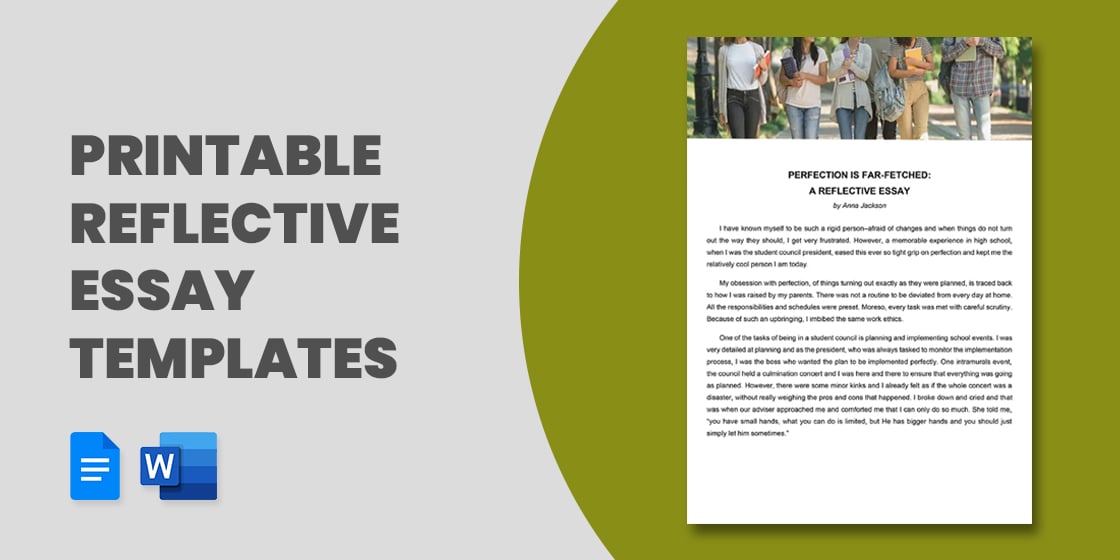
Free Reflective Essay Example Template
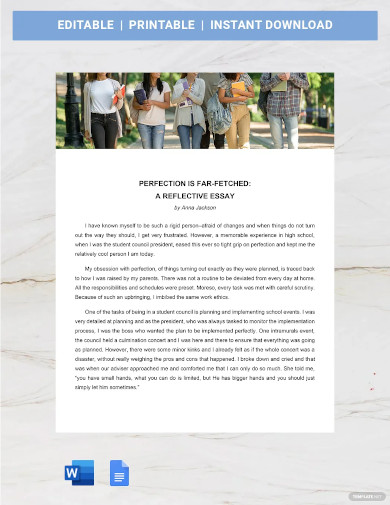
- Google Docs
Reflective Essay Outline Template
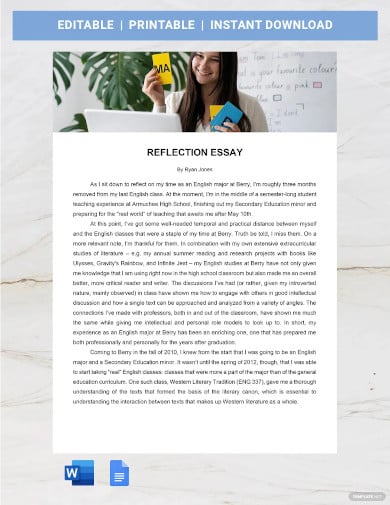
Student Reflective Essay Template
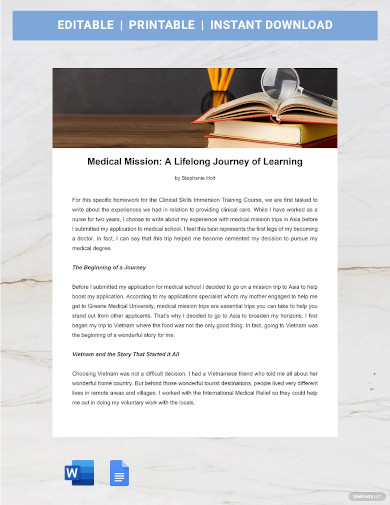
Nursing Reflective Essay Template
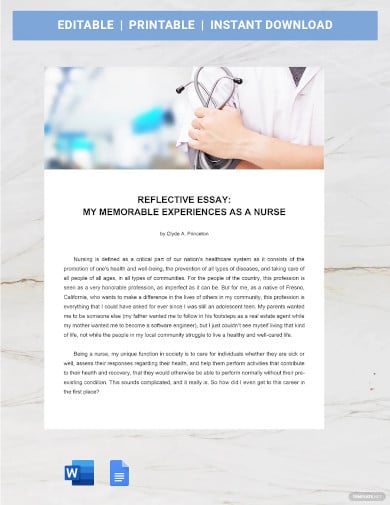
Reflective Essay About Life Experience Template
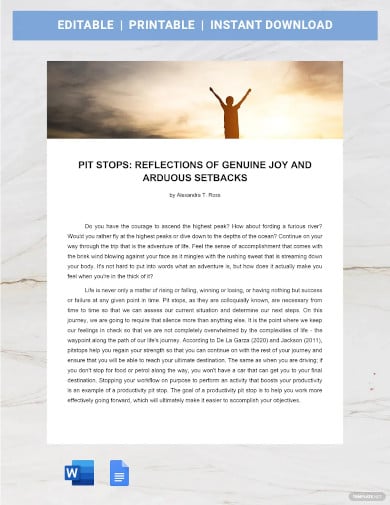
Outline Reflective Essay Template
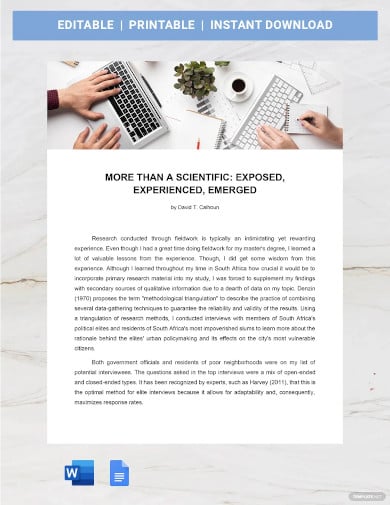
Sample Reflective Essay Template
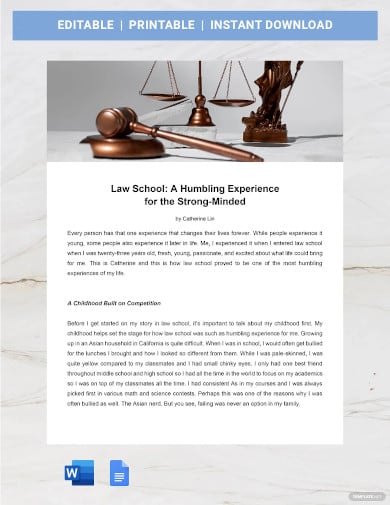
Critical Reflective Essay Template
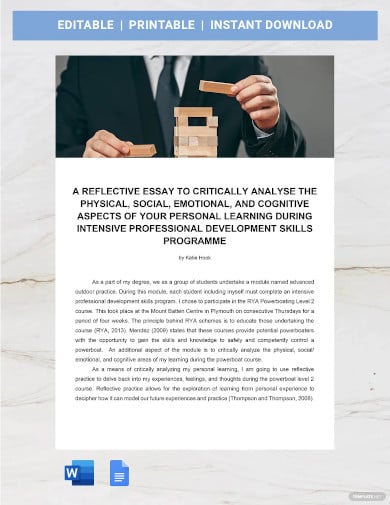
Portfolio Reflective Essay Template
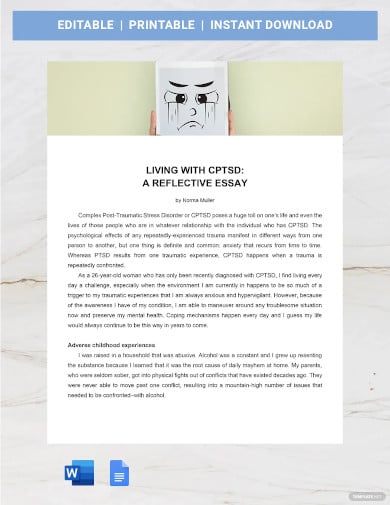
University Reflective Essay Template
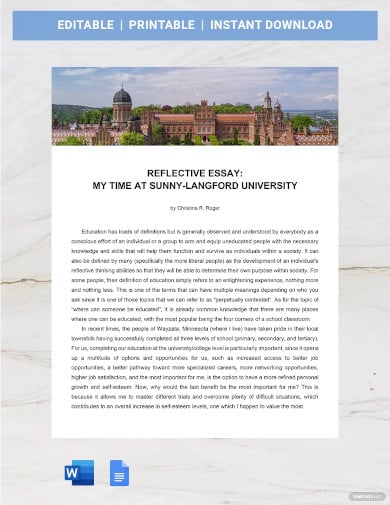
Personal Reflective Essay Template
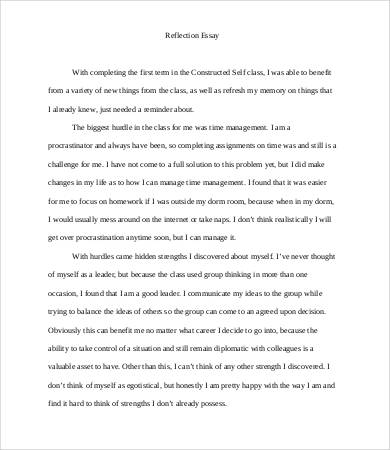
Self Reflective Essay Template
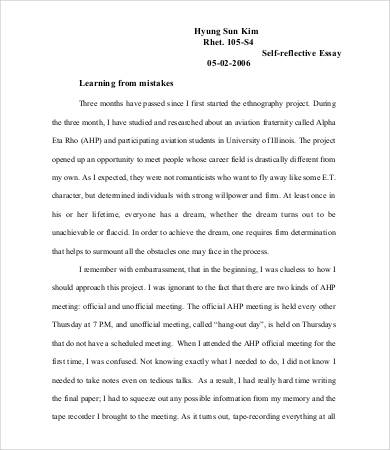
Reflective Essay Plan Template
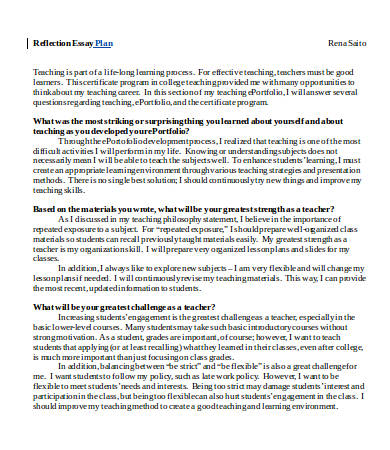
Writing Reflective Essay Template
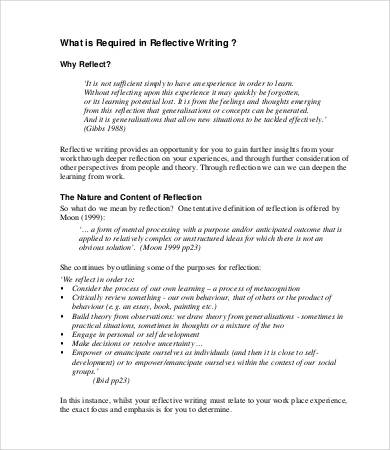
Do Not Describe, Reflect
Writing a reflective essay.
- Know the main thought or event that you are writing. Knowing what the essay is all about will give you a more concise thinking on what to put into your writing.
- Know the strong points that you need to showcase. Point this out especially in answering the question about why a specific event or happening that occurred in your life is worthy to be analyzed.
- Know the entire process of development. State in a way that people can actually relate and understand where you are coming from and how you came up with the specific reflection that you have written.
Reflective Essay Template for High School
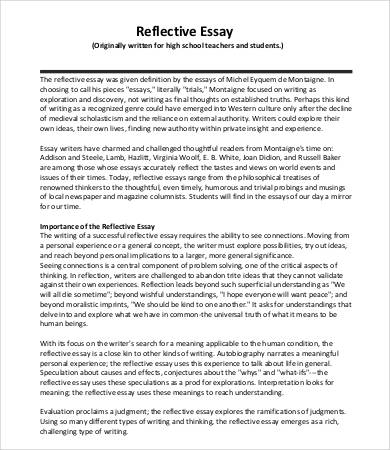
Reflective Expository Essay Template
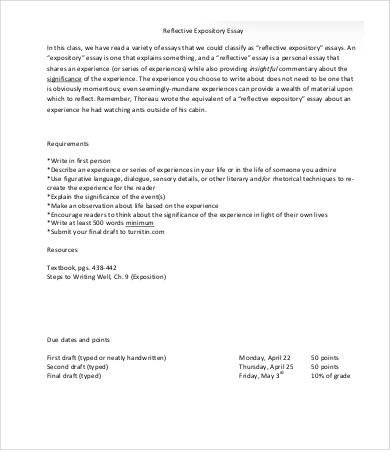
Reflective Narrative Essay Template
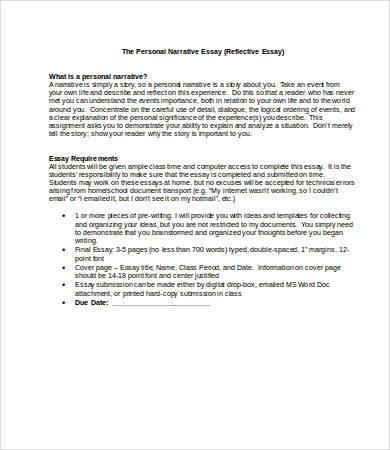
Junior Reflective Essay Template
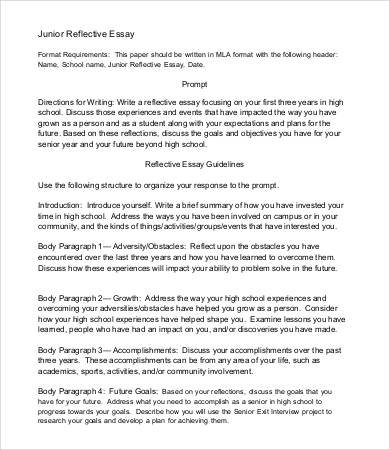
Write as If You Are the Only Person Who Will Read Your Writings
More in essay templates, reflective essay example, reflective essay template, interview essay in apa documentation style template, reflective interview essay template, reflective leadership interview essay template, professional student interview essay template, biography essay template.
- How to Make/Create a College Essay [Templates + Examples] 2023
- How to Make/Create a Rhetorical Analysis Essay [Templates + Examples] 2023
- 5+ Free Descriptive Essay Templates – PDF
- 15+ Essay Format Templates – PDF
- 11+ Free Descriptive Essay Templates – PDF, DOC
- 19+ Essay Templates in PDF
- How to Make/Create a Narrative Essay [Templates + Examples] 2023
- 14+ 5 Paragraph Essay Templates – PDF
- How To Make/Create a 5-Paragraph Essay Outline [Templates + Examples] 2023
- 10+ Argumentative Essay Outline Templates – PDF
- 20+ Interview Essay Templates
- 9+ Leadership Essays
- 13+ Literary Essay Templates in Word | Google Docs | Apple Pages | PDF
- 7+ Extended Essay Templates
- 9+ Free Downloadable Informative Essay Samples and Examples
File Formats
Word templates, google docs templates, excel templates, powerpoint templates, google sheets templates, google slides templates, pdf templates, publisher templates, psd templates, indesign templates, illustrator templates, pages templates, keynote templates, numbers templates, outlook templates.

IMAGES
VIDEO
COMMENTS
To give you a clear idea of structuring a reflective essay template, we broke down the essential steps below. Primarily, the organization of a reflective essay is very similar to other types of papers. However, our custom writers got more specific with the reflective essay outline to ease your writing process. Reflective Essay Introduction
Here's a recap of the contents of this article, which also serves as a way to create a mind map: 1. Identify the topic you will be writing on. 2. Note down any ideas that are related to the topic and if you want to, try drawing a diagram to link together any topics, theories, and ideas. 3.
Use these 5 tips to write a thoughtful and insightful reflection paper. 1. Answer key questions. To write a reflection paper, you need to be able to observe your own thoughts and reactions to the material you've been given. A good way to start is by answering a series of key questions. For example:
What is a Reflective Essay Outline? A reflective essay outline is a layout of one's thoughts and ideas in regard to a specific item. This type of academic writing revolves around a specific response to a topic in the form of a personal reflection. Creating an outline is the first step to a well-written reflective paper.
Blogs are a place to offer your own opinion and can be a really good place to do some reflective writing. Blogger often take a view on something and use their site as a way to share it with the world. They will often talk about the reasons why they like/dislike something - classic reflective writing. 5. During the research process
Writing a reflective essay, also known as a reflective paper or reflection paper, is as easy as following the step-by-step instructions below. 1. Choose a Topic Idea. If you haven't been assigned a topic and don't have a topic in mind, check the list of topics above for inspiration. If those aren't enough, take a look at these 100 reflection ...
4. Writing the Body. Write the body of your essay, which should include the personal reflection, description of the experience, analysis of the experience, evaluation of the experience, identification of key learning, and planning for future action. Make sure to use specific examples and details to support your reflection. 5.
A reflection is an essay, so provide full, thoughtful responses to the questions in your instructor's prompt. The style and tone of your reflective essay should match the purpose of the overall assignment. This is a personal essay meant to showcase what you learned from the text, event, or experience that you are writing about.
1. Choose Your Topic Carefully. If you are given the freedom to choose a topic and don't have any idea regarding it, the best way is to brainstorm and research some trending and good topic ideas. Unfortunately, a common mistake when writing a reflective essay is to choose a topic that is too broad or too narrow. 2.
Reflective Essay Outline Format. The reflective essay format is different from other essays. It is a type of writing in which an essay writer uses the MLA format or APA style. In APA style, you should consider a few points: Use Time New Roman; The font size is 12, and all text should be double-spaced.
Reflective Essay Outline Template. This outline template follows a 5-paragraph format, but you can add paragraphs and rearrange the body paragraphs to fit your needs. Just fill in the blanks with your own information, and you'll be one step closer to a stellar essay.
A reflective essay is a type of written work which reflects your own self. Since it's about yourself, you already have a topic to write about. For reflective essay examples, readers expect you to evaluate a specific part of your life. To do this, you may reflect on emotions, memories, and feelings you've experienced at that time.
Types of reflective writing. 1. REFLECTION: when you ask questions about something you would like to better understand, e.g. a problem to solve or an issue to consider. 2. REFLECTIVE PRACTICE: when you reflect on the relationship between practice in your area of study and the theories you are being introduced to. 3.
Seeing reflective essay examples can help you understand how to accomplish a reflective essay writing assignment. View examples of reflective essays. Dictionary ... The structure and format follow a typical essay writing outline. Begin with a great hook and a strong introduction. Pull the reader in without giving too much away, then provide a ...
Reflective Writing Guide. A great deal of your time at university will be spent thinking; thinking about what people have said, what you have read, what you yourself are thinking and how your thinking has changed. It is generally believed that the thinking process involves two aspects: reflective thinking and critical thinking.
Learn how to create a reflective essay outline through examples. Get a printable reflective essay outline to help craft your own paper.
We thank the students who permitted us to feature examples of their writing. Prepared by Academic Skills, UNSW. This guide may be distributed or adapted for educational purposes. Full and proper acknowledgement is required. Learn more about the different types & examples of reflective writing including journal, learning diary, peer review and more.
Reflective writing is a personal exploration of experiences, analyzing thoughts, feelings, and learnings to gain insights. It involves critical thinking, deep analysis, and focuses on personal growth through structured reflection on past events. In this guide, you'll learn everything you need to know about reflective writing — with lots of ...
Both the language and the structure are important for academic reflective writing. For the structure you want to mirror an academic essay closely. You want an introduction, a main body, and a conclusion. Academic reflection will require you to both describe the context, analyse it, and make conclusions. However, there is not one set of rules ...
Since 2006, Oxbridge Essays has been the UK's leading paid essay-writing and dissertation service. We have helped 10,000s of undergraduate, Masters and PhD students to maximise their grades in essays, dissertations, model-exam answers, applications and other materials.
18+ Printable Reflective Essay Templates. A reflective essay is a write-up usually done to reflect about the things that have transpired in the writer's life. It may be about a thought, a past experience, new learning, and entirely a lot more of personal experiences where inspiration can be drawn from. It deals with the perspective of an ...